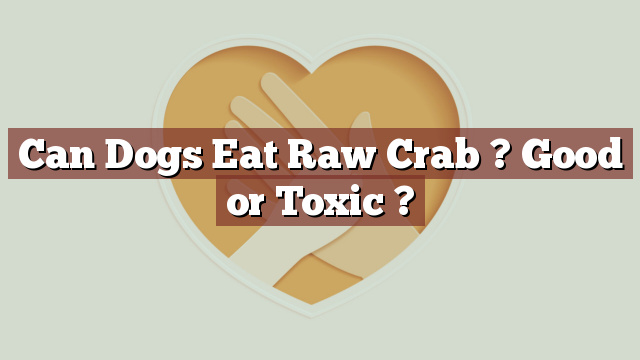Can Dogs Eat Raw Crab? Good or Toxic?
Knowing what foods are safe for our pets is crucial in ensuring their health and well-being. Among the many questions that pet owners may have, one that often arises is whether dogs can safely consume raw crab. In this article, we will explore the nutritional value of raw crab for dogs, discuss its safety, potential risks and benefits, and provide guidance on what to do if your dog happens to eat raw crab.
Nutritional Value of Raw Crab for Dogs
Crab meat is known for its rich nutritional profile, containing essential vitamins and minerals that contribute to a balanced diet. Raw crab is a great source of protein, which is vital for muscle development and repair in dogs. It also provides essential amino acids that promote overall health.
Apart from protein, raw crab contains omega-3 fatty acids, which contribute to a healthy skin and coat in dogs. These fatty acids also have anti-inflammatory properties and support brain function. Additionally, raw crab contains minerals like calcium, phosphorus, iron, and zinc, which are important for bone health, blood production, and proper immune system function.
Is Raw Crab Safe or Toxic for Dogs?
Raw crab is not recommended for dogs. While it may offer some nutritional benefits, there are potential risks associated with feeding raw crab to dogs. Raw seafood, including crab, can contain harmful bacteria and parasites that may cause food poisoning or gastrointestinal issues in dogs.
Furthermore, raw crab shells can pose a choking hazard and may damage a dog’s digestive system if consumed. The high levels of sodium in some types of crab can also be harmful to dogs, as excessive salt intake can lead to dehydration, kidney problems, and other health complications.
It is important to note that some dogs may have allergies or sensitivities to seafood, including crab. Signs of an allergic reaction may include vomiting, diarrhea, itching, or swollen face. If you suspect that your dog may be allergic to crab or any other seafood, it is best to consult with your veterinarian.
Potential Risks and Benefits of Feeding Dogs Raw Crab
Feeding raw crab to dogs can pose several risks, as mentioned earlier. The potential risks include bacterial contamination, parasites, choking hazards, and high sodium content. These risks outweigh any potential benefits that raw crab may offer.
While crab meat does contain beneficial nutrients, there are safer alternatives available for dogs to obtain those nutrients. Cooked and properly prepared crab meat can be a safer option if you wish to incorporate it into your dog’s diet. However, it is still advisable to consult with your veterinarian before doing so.
What to Do If Your Dog Eats Raw Crab
If you suspect that your dog has consumed raw crab or any seafood, it is important to monitor their behavior and watch for any signs of illness. If your dog shows symptoms such as vomiting, diarrhea, abdominal pain, or lethargy, it is crucial to seek veterinary attention immediately.
Additionally, if you are aware that your dog has ingested raw crab shells, it is important to contact your vet, as they may require medical intervention to prevent any potential complications.
Conclusion: Considerations for Feeding Dogs Raw Crab
In conclusion, feeding dogs raw crab is not recommended due to the potential risks associated with bacterial contamination, parasites, choking hazards, and high sodium content. While raw crab may offer some nutritional benefits, there are safer alternatives available for dogs to obtain those nutrients.
If you wish to incorporate crab into your dog’s diet, opt for cooked and properly prepared crab meat instead. However, it is always advisable to consult with your veterinarian before introducing any new food into your dog’s diet, especially if you have concerns about allergies or sensitivities.
Ensuring the safety and well-being of our furry friends should always be our top priority, and being informed about the potential risks and benefits of certain foods is an important step in achieving that goal.
Thank you for investing your time in exploring [page_title] on Can-Eat.org. Our goal is to provide readers like you with thorough and reliable information about various dietary topics. Each article, including [page_title], stems from diligent research and a passion for understanding the nuances of our food choices. We believe that knowledge is a vital step towards making informed and healthy decisions. However, while "[page_title]" sheds light on its specific topic, it's crucial to remember that everyone's body reacts differently to foods and dietary changes. What might be beneficial for one person could have different effects on another. Before you consider integrating suggestions or insights from "[page_title]" into your diet, it's always wise to consult with a nutritionist or healthcare professional. Their specialized knowledge ensures that you're making choices best suited to your individual health needs. As you navigate [page_title], be mindful of potential allergies, intolerances, or unique dietary requirements you may have. No singular article can capture the vast diversity of human health, and individualized guidance is invaluable. The content provided in [page_title] serves as a general guide. It is not, by any means, a substitute for personalized medical or nutritional advice. Your health should always be the top priority, and professional guidance is the best path forward. In your journey towards a balanced and nutritious lifestyle, we hope that [page_title] serves as a helpful stepping stone. Remember, informed decisions lead to healthier outcomes. Thank you for trusting Can-Eat.org. Continue exploring, learning, and prioritizing your health. Cheers to a well-informed and healthier future!

